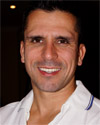
Article By Dr. Mike Prebeg, Certified Chiropractic Sports Physician
Consulting Chiropractor, Toronto Blue Jays
Consulting Chiropractor, NHLPA
Clinical Instructor, McMaster University Contemporary Acupuncture Program
Dr. Mike Prebeg, is at our Toronto, King & Yonge location.
Five Essential Eating Habits Of Successful Athletes
“It is essential to eat a complete and balanced diet full of whole, pure foods, while avoiding processed, sugary foods.”
Recently, I had the privilege of attending an event where retired NHL player, Gary Roberts (Hockey Strength and Development Coach, and nutrition advocate) in association with Natures Emporium, highlighted the importance of nutrition to a group of aspiring young athletes, their parents and coaches. He offered knowhow that inspired me to write this article to share five practical tips that promote health and athletic performance:
1. Eat Whole, Pure Foods
Whole and pure foods are those that have not been refined and do not contain chemicals and additives. Examples of these are organic meats, vegetables, fruit and whole grains; including these in your diet helps the body get the nutrients it needs, limiting the need for supplements.
2. White Processed Foods are BAD and should be avoided
The opposite of whole and pure, these foods contain preservatives, chemicals and have been stripped of their nutritional value during processing. White rice, pasta and sugar fall into this category. With their original vitamins, minerals and fiber removed, they are mostly starch, and along with sugar contribute to irregular blood sugar levels and should be avoided as much as possible.
3. Avoid Energy Drinks and Sugary Beverages
Energy drinks have recently gained a lot of popularity amongst younger kids and athletes and are being used as a way to replenish energy or balance electrolytes. But, their high caffeine and sugar content can have hazardous effects on long term health, leading to severe spikes and lows in blood sugar, and excessive sugar being stored as fat. Instead, replace these with a shake made with coconut water which has many minerals essential for the body after a practice session or game.
4. Eat Smaller Amounts More Often
Replacing three big and heavy meals with 4-6 smaller ones is a better way to provide the body with sustained energy throughout the day. Regular and small meals are easier to digest and prevent the body from going into starvation mode. Not only do you limit binging on junk foods, but by training the metabolism to digest and burn calories efficiently, overall mental and physical performance is improved.
5. Eat After the Practice or Game
A healthy snack or a meal high in protein and good fats is essential to repair the body’s muscles and tissues after a practice or game. A chocolate shake with a banana and some almond butter if you are on the go or a meal of 3 oz chicken breast with broccoli/brown rice will provide the essential nutrients the body needs after a demanding game or practice session.
Eating a balanced diet, which includes a variety of whole and pure foods such as organic meats, vegetables, grains, nuts, seeds and fruits is not only important but crucial for athletes. Therefore, remember to include these simple guidelines in your everyday diet to achieve peak performance, healthy growth and overall well-being.
Click to find out more about Dr. Mike Prebeg at Athlete's Care in Toronto















